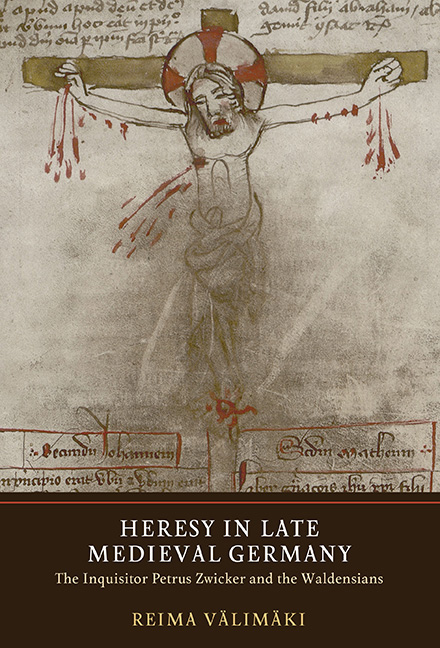Book contents
- Frontmatter
- Dedication
- Contents
- List of Illustrations
- Author's Note
- Acknowledgements
- List of Abbreviations
- Introduction
- 1 Petrus Zwicker and the Career of an Inquisitor at the Turn of the Fifteenth Century
- 2 The Inquisitor Writes
- 3 The Inquisitor's Practice and his Legacy
- 4 Communicating Faith
- 5 The Dissidents, the Clergy and the Church
- Epilogue: The Consolation of Inquisition
- Appendix 1 Manuscript Descriptions
- Appendix 2 Chapters and Titles of the Cum dormirent homines according to Jacob Gretser (1613/77)
- Appendix 3 The Circulation of the Processus Petri together with the Cum dormirent homines
- Appendix 4 Inquisitors' Manuals of St Florian and Linz
- Appendix 5 Collation of Formularies in St Florian, MS XI 234 and Würzburg, UB MS M. ch. f. 51
- Bibliography
- Index
- YORK MEDIEVAL PRESS: PUBLICATIONS
- Frontmatter
- Dedication
- Contents
- List of Illustrations
- Author's Note
- Acknowledgements
- List of Abbreviations
- Introduction
- 1 Petrus Zwicker and the Career of an Inquisitor at the Turn of the Fifteenth Century
- 2 The Inquisitor Writes
- 3 The Inquisitor's Practice and his Legacy
- 4 Communicating Faith
- 5 The Dissidents, the Clergy and the Church
- Epilogue: The Consolation of Inquisition
- Appendix 1 Manuscript Descriptions
- Appendix 2 Chapters and Titles of the Cum dormirent homines according to Jacob Gretser (1613/77)
- Appendix 3 The Circulation of the Processus Petri together with the Cum dormirent homines
- Appendix 4 Inquisitors' Manuals of St Florian and Linz
- Appendix 5 Collation of Formularies in St Florian, MS XI 234 and Würzburg, UB MS M. ch. f. 51
- Bibliography
- Index
- YORK MEDIEVAL PRESS: PUBLICATIONS
Summary
On 13 February 1393, Peter Beyer from Bernwalde, accused of Waldensian heresy, was interrogated by the inquisitor Petrus Zwicker in the Pomeranian town of Stettin. During his detailed deposition Peter Beyer provided a small but revealing detail about how laymen sympathetic to Waldensian beliefs experienced their situation in the 1390s. Beyer was apparently a sort of trustee of the Waldensian Brethren, who as itinerant lay confessors and preachers formed the intellectual and spiritual nucleus of the Waldensian movement. Peter Beyer hosted the Brethren and donated money to them, and also took care of some cash on their behalf. However, some time before his interrogation he had improvised with some of the funds actually intended for the Brethren. Peter Beyer ‘had given four marks to the poor – for God – after he had heard that there was disruption among the sectaries’.
The disruption or destruction Beyer referred to was caused by the intensification of proceedings against the Waldensians in German-speaking Europe. After being declared heretics in 1184, mainly because of their disobedience to ordained clergy rather than for doctrinal divergence, the Waldensians had been persecuted to a greater or lesser degree throughout the High Middle Ages. Over the years the Waldensian groups had developed into a distinct religious movement, characterized by lay preaching and confession, literal imitation of apostolic life and disapproval of clerical hierarchy and the Church's material possessions. Until the late fourteenth century the Waldensians had enjoyed a relative lack of attention and persecution in many German regions, but this came to an end with the inception of an unprecedented series of inquisitions and other proceedings against them.
The persecution had devastating effects on the Waldensian communities, and it also reshaped how heresy was perceived, refuted and repressed. Previous studies have demonstrated that the inquisitio heretice pravitatis (inquisition of heretical wickedness) was not a static power structure controlling deviance in medieval Christendom. It was a reflective discourse, a changing set of laws and rules, practices and instructions, technologies of speech, theology and bureaucracy. In addition, the self-understanding of its representatives, the inquisitors, developed over time. Christine Caldwell Ames has studied how churchmen – and particularly Dominicans – came to understand the inquisition as a pious enterprise, as a fulfilment of Christ's promise to bring a sword.
- Type
- Chapter
- Information
- Heresy in Late Medieval GermanyThe Inquisitor Petrus Zwicker and the Waldensians, pp. 1 - 21Publisher: Boydell & BrewerPrint publication year: 2019



